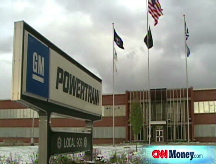Three banks in California, Georgia fail
Regulators close down two California thrifts and Community Bank of Loganville, Ga., raising the toll in the financial crisis to 22 banks.
NEW YORK (CNNMoney.com) -- Three more banks - two in California and one in Georgia - failed Friday, bringing to 22 the number of institutions forced to close in the wake of the financial crisis.
The Federal Deposit Insurance Corp. said the banking operations of Downey Savings and Loan Association of Newport Beach, Calif., and PFF Bank & Trust of Downey, Calif., were acquired by U.S. Bank (USB, Fortune 500) of Minneapolis.
The two banks, which will reopen as U.S. Bank beginning Saturday, have a total of 213 branches and 2,900 employees, according to the Office of Thrift Supervision (OTS), the banks' regulator.
As of Sept. 30, Downey Savings had total assets of $12.8 billion and total deposits of $9.7 billion. PFF Bank had total assets of $3.7 billion and total deposits of $2.4 billion.
Both banks have been hit hard by the mortgage meltdown, according to the OTS.
"The closing of these two thrifts once again demonstrates the tremendous impact of the housing market distress on the state of California," said OTS director John Reich in a statement.
Under terms of the FDIC-arranged deal, U.S. Bank will assume the first $1.6 billion of the combined banks' asset losses, with the FDIC sharing in any further losses.
The FDIC said U.S. Bank will implement a loan modification program similar to the one announced in August for IndyMac Bank of Pasadena, Calif., which was seized by the federal agency the previous month.
The agency said both Downey and PFF customers should continue existing branches until U.S. Bank can fully integrate the deposit records of the organizations. Depositors will have full weekend access to their money by writing checks or using ATM or debit cards.
Earlier, Loganville, Ga.- based Community Bank was shuttered by the Georgia Department of Banking and Finance. The FDIC took over the assets and Tappahannock, Va.-based Bank of Essex will assume all Community Bank's deposits.
Community Bank had total assets of $681 million and total deposits of $611.4 million as of mid-October.
Bank of Essex purchased $84.4 million of the failed bank's assets and paid the FDIC $3.2 million for the right to take over the failed bank's deposits. The FDIC will hold onto the remaining assets to disperse at a later time.
The Community Bank has four branches, which will all open Monday as the Bank of Essex. Through the weekend, customers of the failed bank will be able to access their funds by writing checks or using ATM or debit cards. Checks drawn on the bank will continue to be processed and loan customers should continue to make their payments as usual.
The FDIC said that the cost of the acquisition would be between $200 million and $240 million, but as with other bank failures, the transaction was the least expensive resolution.
With Friday's failures, five California banks and three Georgia banks have been among the 22 forced to shut down in the current crisis.
On Friday, the Office of the Comptroller of the Currency (OCC) broadened "the pool of potential buyers available to buy troubled institutions" by allowing groups of private investors, and not just other banks, to take over failed institutions.
Several investors, led by Hilltop Holdings Inc., became the first group to qualify under the new "shelf charter" by agreeing Friday to take over Ford Group Bank, a Texas regional firm. However, the OCC approval is still preliminary and final authorization will only come after all requirements are met within 18 months.
Banks have been struggling to keep afloat as choked borrowers have been unable to pay their loans back, especially mortgage payments.
The $700 billion bailout, signed into law in early October, was supposed to be used for buying up toxic mortgage debt from struggling financial institutions to free up lending. But last week, Treasury Secretary Henry Paulson said the funds would now be used for injecting capital directly into the banks.
Banks have also been criticized for not using the bailout cash to increase lending to consumers and businesses.
Banks and lawmakers went head to head over that very issue last week. Lawmakers say that banks need to use the funds to make credit more available to consumers and borrowers. Banks, however, said they were doing what they could to increase lending and to work with delinquent homeowners.
The Treasury department has been dolling out capital to qualified banks. Monday, the government dispersed $33.56 billion to 21 banks in a second round of payments. The government previously distributed $125 billion to nine banks in the form of stock purchase programs. ![]()




